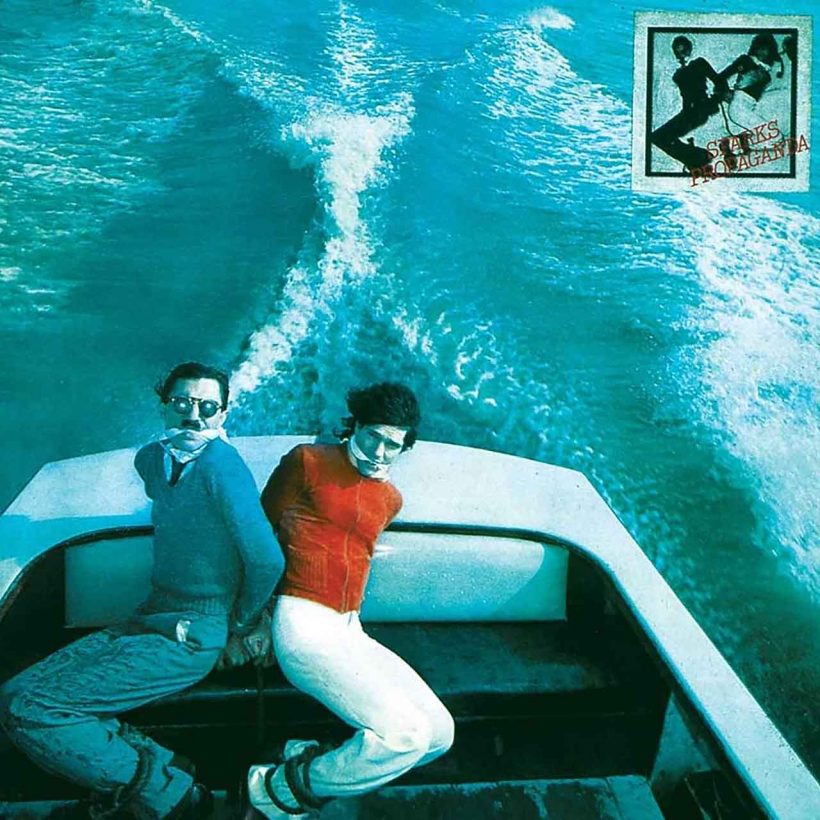‘Propaganda’: How Sparks’ Fourth Album Won Friends And Influenced The Top 10
Under pressure to deliver after the success of ‘Kimono My House,’ Ron and Russell Mael again came up with the goods.

One of rock’s most oft-repeated clichés is that most bands find it “difficult” to make their third album. Well, Sparks weren’t – and still aren’t – like most bands. Instead, Ron and Russell Mael’s group sailed through their third, May 1974’s sublime Kimono My House – but while that gold-certified, game-changing record yielded mainstream acceptance, its success put Sparks under extra pressure to deliver with their fourth album, Propaganda.
“You’re always hoping there’s enough of an audience that’s expecting something, but making Propaganda was hard because we were under the microscope,” Ron Mael reflected in the liner notes for Island’s 2006 edition of the album. “We knew we’d staked out our own area that we needed to top. We didn’t want to work in a different style, but to evolve.”
Listen to Sparks’ Propaganda now.
Sparks certainly caught the eyes (and ears) of the wider public in their adopted UK homeland during the summer of 1974. Kimono My House spawned two sizeable Top 10 hits courtesy of the dramatic “This Town Ain’t Big Enough for Both of Us” and the infectiously poppy “Amateur Hour,” while the album itself peaked at No. 4. On top of that, Sparks’ unmissable TV appearances – wherein Russell’s acrobatic vocals and energetic presence starkly contrasted with Ron’s toothbrush mustache and scowling demeanor – briefly turned the Mael brothers into household names.
Despite the adulation, Sparks had problems to solve in the early fall of 1974. Firstly, they had to endure a personnel reshuffle. The Mael brothers decided to retain the services of drummer Norman ‘Dinky’ Diamond and guitarist Adrian Fisher from the Kimono My House lineup, but they enlisted a new bassist, Ian Hampton, to replace the departing Martin Gordon, and they also recruited a second guitarist, Trevor White.
Even more pressingly, they had no songs left over from the Kimono My House sessions – forcing primary songsmith Ron Mael to embark on an intensive writing spree. Mael was ready. “I remember strumming a guitar or sitting at the piano and just coming up with all these songs,” the keyboardist recalled in 2006. “We were so energized by the reaction to Kimono My House, the creative juices just went into overdrive.”
While he may have written these songs with one eye on the clock, it’s to Mael’s eternal credit that Propaganda bore no discernible drop off in quality from Kimono My House. Again recorded at London’s Air Studios with Kimono My House producer Muff Winwood at the controls, the record offered quality from wall to wall. Sparks’ quintessential, glam-tinged rock sound again triumphed on the likes of “Thanks But No Thanks,” “Don’t Leave Me Alone with Her” and the muscular “At Home, At Work, At Play,” but the record’s tracklist also welcomed significantly quirkier fare such as “Who Don’t Like Kids” and the anthemic, scarf-waving “Reinforcements.”
Witty, engaging, and always resonant, all of the above displayed Ron’s talent for writing what Mojo’s Martin Aston called “narratives of hapless men often pitched against authoritarian women, amid horribly misconceived notions of love.” Nowadays, Sparks’ keyboardist is widely lauded as one of rock’s most singular lyricists, but even this early in his career, the senior Mael brother was subverting the standard rules for writing pop songs.
“I try to avoid clichés musically, or to use clichés in ways that haven’t been used before,” he revealed in the Propaganda liners. “It’s the same with romantic situations. Love songs are generally either happy or sad, but there are so many ways to talk about relationships and put them in a new context. ‘Don’t Leave Me Alone with Her,’ for example, takes the opposite tack to most guys’ wishes.”
Elsewhere, an often misunderstood Ron Mael lyric formed the basis of Propaganda’s biggest spin-off hit, the slow-burning ballad “Never Turn Your Back On Mother Earth.” Misread as a pro-environmental song by another master lyricist, The Kinks’ Ray Davies, during one contemporary BBC Radio broadcast, the song actually relates to what Ron refers to as nature’s “really mean streak” and how humans should never underestimate its fickle (and volatile) qualities. However, none of that prevented the song from shooting to No. 13 in the UK and the album produced a second hit with the storming “Something for the Girl with Everything,” which rose to No. 17.
The result of photographer Monty Coles’ request “to do something dangerous,” Propaganda came housed in a memorable sleeve depicting the Mael brothers bound and gagged in a speedboat. It was greeted by a brace of positive press notices, with the Los Angeles Times’ Robert Hilburn suggesting it was “a merger of the concepts/vision of Ray Davies, the wall-of-sound production style (without the tape echo) of Phil Spector, and the lavish peppery arrangement tendencies of [the] A Clockwork Orange soundtrack.”
Officially released on November 11, 1974, Propaganda deservedly carried on where Kimono My House left off, rising to No. 9 on the UK album chart and winning the band a silver disc. It also climbed to No. 63 on North America’s Billboard 200 (astonishingly, still Sparks’ best US album performance), and it remains a staunch fan favorite. It’s even the one from Sparks’ initial halcyon period that Ron Mael is most liable to talk up today.
“Some of the tracks on Kimono My House stand out strongly for me, but for me, Propaganda holds together as a musical piece,” he said in 2006. “Maybe that’s because of the extreme quickness in which it was written, but the quality still holds up. It’s my favorite of the two.”














